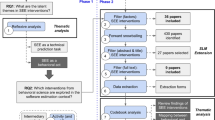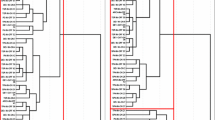Abstract
The effort required to complete software projects is often estimated, completely or partially, using the judgment of experts, whose assessment may be biased. In general, such bias as there is seems to be towards estimates that are overly optimistic. The degree of bias varies from expert to expert, and seems to depend on both conscious and unconscious processes. One possible approach to reduce this bias towards over-optimism is to combine the judgments of several experts. This paper describes an experiment in which experts with different backgrounds combined their estimates in group discussion. First, 20 software professionals were asked to provide individual estimates of the effort required for a software development project. Subsequently, they formed five estimation groups, each consisting of four experts. Each of these groups agreed on a project effort estimate via the pooling of knowledge in discussion. We found that the groups submitted less optimistic estimates than the individuals. Interestingly, the group discussion-based estimates were closer to the effort expended on the actual project than the average of the individual expert estimates were, i.e., the group discussions led to better estimates than a mechanical averaging of the individual estimates. The groups’ ability to identify a greater number of the activities required by the project is among the possible explanations for this reduction of bias.
Similar content being viewed by others
References
Adams, S. 2002. Dilbert and the way of the weasel. HarperCollins Publishers Inc.
Armstrong, J. S. 2001. Principles of forecasting. Boston: Kluwer Academic Publishers.
Aronson, E., Wilson, T. D., and Akert, R. M. 1999. Social Psychology. Addison-Wesley Educational Publishers Inc.
Atkinson, R. L., Atkinson, R. C., Smith, E. E., Bem, D. J., and Nolen-Hoeksema, S. 1996. Hilgard's Introduction to Psychology. Orlando: Harcourt Brace College Publishers.
Bem, D. J., Wallach, M. A., and Kogan, N. 1965. Group decision making under risk of aversive consequences. Journal of Personality and Social Psychology 1(5): 453–460.
Boehm, B., Abts, C., Brown, A. W., Chulani, S., Clark, B. K., Horowitz, E., Madachy, R., Reifer, D., and Steece, B. 2000. Software cost estimation with Cocomo II. New Jersey: Prentice-Hall.
Boehm, B. W. 1981. Software engineering economics. New Jersey: Prentice-Hall.
Boehm, B. W. 1984. Software engineering economics, IEEE Transactions on Software Engineering 10(1): 4–21.
Brown, R. 1988. Group Processes. Cambridge: Blackwell Publishers.
Cohen, J. 1969. Statistical power analysis for the behavioral sciences. New York: Academic Press, Inc.
Cromwell, P. F., Marks, A., Olson, J. N., and Avary, D. W. 1991. Group effects on decision making by burglars. Psychological reports 69: 579–588.
DeMarco, T. 1982. Controlling software projects. New York: Yourdon Press.
Fairley, D. 2002. Making accurate estimates. IEEE Software 19(6): 61–63.
Fenton, N. E. 1995. Software Metrics. London: Thompson Computer Press.
Fischer, G. W. 1981.When oracles fail-A comparison of four procedures for aggregating subjective probability forecasts. Organizational Behavior and Human Performance 28(1): 96–110
Forsyth, D. R. 1999. Group Dynamics. Wadsworth Publishing Company.
Gray, A., MacDonnell, S., and Shepperd, M. 1999. Factors systematically associated with errors in subjective estimates of software development effort: The stability of expert judgment. In Sixth International Software Metrics Symposium, pp. 216–227, IEEE Comput. Soc., Los Alamitos, CA, USA.
Heemstra, F. J., and Kusters, R. J. 1991. Function point analysis: Evaluation of a software cost estimation model.European Journal of Information Systems 1(4): 223–237.
Helmer, O. 1966. Social Technology. New York: Basic Books.
Hewstone, M., Stroebe, W., and Stephenson, G. M. 1996. Introduction to social psychology. Oxford: Blackwell Publishers Ltd.
Hihn, J., and Habib-Agahi, H. 1991. Cost estimation of software intensive projects: A survey of current practices. In International Conference on Software Engineering, pp. 276–287, IEEE Comput. Soc. Press, Los Alamitos, CA, USA.
Hill, J., Thomas, L. C., and Allen, D. E. 2000. Experts' estimates of task durations in software development projects. International Journal of Project Management 18(1): 13–21.
Höst, M., and Wohlin, C. 1998. An experimental study of individual subjective effort estimations and combinations of the estimates. In International Conference on Software Engineering, pp. 332–339, IEEE Comput. Soc., Los Alamitos, CA, USA, Kyoto, Japan.
Hughes, R. T. 1996. Expert judgment as an estimating method. Information and Software Technology 38(2): 67–75.
Humphrey, W. S. 1990. Managing the Software Process. Addison-Wesley Publishing Company, Inc.
Jørgensen, M. 1997. An empirical evaluation of the MkII FPA estimation model. In Norwegian Informatics Conference, pp. 7–18, Tapir, Oslo, Voss, Norway.
Jørgensen, M. 2003. An attempt to model software development effort estimation accuracy and bias. In Proceedings of Conference on Empirical Assessment in Software Engineering-2003 (EASE 2003), pp. 117–128, Keele, UK.
Jørgensen, M. 2004.A review of studies on expert estimation of software development effort. Journal of Systems and Software 70(1-2): 37–60.
Jørgensen, M., and Moløkken-østvold, K. 2002. Combination of software development effort prediction intervals: Why, when and how? In Fourteenth IEEE Conference on Software Engineering and Knowledge Engineering (SEKE'02), pp. 425–428, Ischia, Italy.
Kernaghan, J. A., and Cooke, R. A. 1990.Teamwork in planning innovative projects: Improving group performance by rational and interpersonal interventions in group process. IEEE Transactions on Engineering Management 37(2): 109–116.
Kitchenham, B. 1996. Software Metrics: Measurement for Software Process Improvement. Oxford: NCC Blackwell.
Kitchenham, B., Pfleeger, S. L., McColl, B., and Eagan, S. 2002a. An empirical study of maintenance and development estimation accuracy. Journal of systems and software 64: 55–77.
Kitchenham, B., Pfleeger, S. L., Pickard, L. M., Jones, P. W., Hoaglin, D. C., El Emam, K., and Rosenberg, J. 2002b. Preliminary guidelines for empirical research in software engineering. IEEE Transactions on software engineering 28(8): 721–734.
Lederer, A. L., and Prasad, J. 1993. Information systems software cost estimating: A current assessment. Journal of Information Technology 8(1): 22–33.
Liden, R. C., Wayne, S. J., Sparrowe, R. T., Kraimer, M. L., Judge, T. A., and Franz, T. M. 1999. Management of poor performance: A comparison of manager, group member, and group disciplinary decisions. Journal of Applied Psychology 84(6): 835–850.
McDonald, A., and Welland, R. 2001. Web engineering in practice. In Proceedings of the Fourth WWW10 Workshop on Web Engineering, pp. 21–30.
Moløkken-østvold, K., and Jørgensen, M. 2003.A review of surveys on software effort estimation. In 2003 ACM-IEEE International Symposium on Empirical Software Engineering (ISESE 2003), pp. 220–230, Italy: IEEE, Frascati-Monte Porzio Catone (RM).
Moses, J., and Clifford, J. 2000. Learning how to improve effort estimation in small software development companies. In 24th Annual International Computer Software and Applications Conference, pp. 522–527, IEEE Comput. Soc., Los Alamitos, CA, USA, Taipei, Taiwan.
Paynter, J. 1996. Project estimation using screenflow engineering. In International Conference on Software Engineering: Education and Practice, pp. 150–159, IEEE Comput. Soc. Press, Los Alamitos, CA, USA, Dunedin, New Zealand.
Reifer, D. J. 2000. Web development: Estimating quick-to-market software. IEEE Software 17(6): 57–64.
Rowe, G., and Wright, G. 2001. Expert opinions in forecasting: The role of the Delphi process. In J. S. Armstrong (ed.), Principles of forecasting: A handbook for researchers and practitioners, pp. 125–144, Boston: Kluwer Academic Publishers.
Shepperd, M., Shofield, C., and Kitchenham, B. 1996. Effort estimation using analogy. In International Conference on Software Engineering, pp. 170–178, IEEE Comput. Soc. Press, Los Alamitos, CA, USA, Berlin, Germany.
Stoner, J. A. F. 1961. A comparison of individual and group decisions involving risks.
Taff, L. M., Borcering, J. W., and Hudgins, W. R. 1991. Estimeetings: Development estimates and a front end process for a large project. IEEE Transactions on software engineering 17(8): 839–849.
Thomsett, R. 1996. Double Dummy Spit and other estimating games. American programmer 9(6): 16–22.
Wallach, M. A., Kogan, N., and Bem, D. J. 1964. Diffusion of responsibility and level of risk taking in groups. Journal of abnormal and social psychology 68(3): 263–274.
Wiegers, K. E. 2000. Stop promising miracles. Software Development Magazine (February).
Winkler, R. L. 1989. Combining forecasts: A philosophical basis and some current issues. International Journal of Forecasting 5(4): 605–609.
Wonnacott, T. H., and Wonnacott, R. J. 1990. Introductory statistics. John Wiley & Sons, Inc.
Zuber, J. A., Crott, H. W., and Werner, J. 1992. Choice shift and group polarization: An analysis of the status of arguments and social decision schemes. Journal of Personality and Social Psychology 62(1): 50–61.
Rights and permissions
About this article
Cite this article
Moløkken-Østvold, K., Jørgensen, M. Group Processes in Software Effort Estimation. Empirical Software Engineering 9, 315–334 (2004). https://doi.org/10.1023/B:EMSE.0000039882.39206.5a
Issue Date:
DOI: https://doi.org/10.1023/B:EMSE.0000039882.39206.5a




